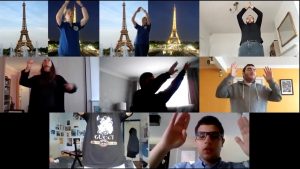We’re celebrating all things Tackling Inequalities (TIF) fund alongside our partners and friends across the UK this week. For the first of two pieces on our involvement in the project Elliot Watson, Get Yourself Active Project Support Officer looks back at the last year of TIF work.
Disability Rights UK first became one of Sport England’s national delivery partners for the Tackling Inequalities Fund (TIF) in July 2020 as the effects of the pandemic were still widespread and difficult to completely appreciate.
When we initially became partners, we believed it was going to be a short-term project lasting only six months. The aim was dealing with the immediate effects of the pandemic which had dramatically affected Disabled people’s physical activity levels. However, it soon became apparent the pandemic was not going away as quick as we first hoped. Fourteen months on, from when we first became a TIF delivery partner, we are continuing to administer the fund and support Disabled people across the country. To date, we have funded 46 projects supporting over 2000 Disabled people to become more active.

Starting out
In the early stages of delivery, we concentrated on helping Disabled people to become more active. We soon discovered through engagement with our TIF partners that the social side of physical activity was just as important, if not more.
One of the emerging themes that we kept hearing in our feedback sessions with our partners was that Disabled people were becoming more levels anxious due to social isolation caused by many having to shield. Thus, Disabled people were keen to participate in physical activity sessions to have the opportunity to interact with others. It was as if the physical activity element was the catalyst for connections to be built with one another in times of such need. Physical activity was a chance to make friends and feel part of a strong, vibrant community.
The pandemic posed a wide range of issues for the organisations we worked with. With a tiered system of restrictions imposed by the government and a string of lockdowns, many of them were forced to move their activities entirely online.
In the initial stages, this posed quite a challenge for many organisations and their users. Many had to learn to use new pieces of software such as Zoom and Teams or troubleshoot failing WIFI or sound issues.
It also became clear over time that some participants were starting to prefer the online delivery style. For instance, some people previously didn’t feel confident enough to attend in-person exercise classes because of a variety of barriers – such as not being able to keep up with the rest of the group or not being able to do all of the exercises demonstrated by the instructor.
By doing it from home, it meant that they could take things at their own pace and turn off their camera/microphone to take a couple of minutes for themselves, removing that barrier of anxiety. Some Disabled people have told us that virtual sessions like these would help them to build their confidence to a point where they might feel comfortable enough to attend in-person sessions one day.
The move online also made it easier for some Disabled people to exercise, as even before Covid, many Disabled people struggled to find appropriate transport to get them to venues or events. With sessions taking place virtually suddenly this barrier was removed with the option of online classes, especially when sessions were recorded, and Disabled people could access them at their leisure.

Digital divides
The move to online delivery methods did however exacerbate other inequalities such as the growing digital divide. It soon became apparent that some Disabled people did not have adequate access to the internet or the right device to be able to successfully take part in online sessions. Unfortunately, this meant that some people were excluded from sessions which they would have been able to attend in person pre-covid. To try and combat this, organisations were incorporating IT sessions or loaning schemes of iPads/laptops into their bids to help keep as many of their users engaged as possible.
As with so much during this pandemic, we learnt so much throughout the process which help us to look to the future. From the feedback we have received from our TIF partners in our share and learn events, it seems that as we start to emerge from the pandemic, a large proportion of our TIF partners are hoping to incorporate a hybrid delivery approach. This hybrid approach will include a mixture of online and in-person sessions to best meet the needs of as many individuals as possible and we’re excited to see what happens next!
We are keen to continue our focus on groups underrepresented in Disabled people’s sport & physical activity. If you work with or are an organisation in the BAME community, women and girls, and/or from lower socioeconomic groups to become more active we would especially like to hear from you. if you’re interested or know of anyone that may be interested in applying, please let us know at tacklinginequalities@disabilityrightsuk.org Tel: 0203 687 0771